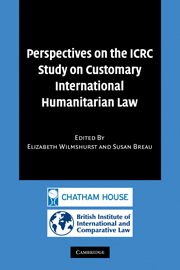Book contents
- Frontmatter
- Contents
- Preface
- List of contributors
- Table of cases
- Table of treaties and other instruments
- Abbreviations
- Part 1 Setting the scene: Theoretical perspectives on international law in the ICRC Study
- 1 The methodological framework of the Study
- 2 The approach to customary international law in the Study
- 3 Other areas of customary law in relation to the Study
- Part 2 The status of conflict and combatants: The ICRC Study
- Part 3 Commentary on selected Rules from the ICRC Study
- Part 4 Conclusions
- Index
3 - Other areas of customary law in relation to the Study
Published online by Cambridge University Press: 09 July 2009
- Frontmatter
- Contents
- Preface
- List of contributors
- Table of cases
- Table of treaties and other instruments
- Abbreviations
- Part 1 Setting the scene: Theoretical perspectives on international law in the ICRC Study
- 1 The methodological framework of the Study
- 2 The approach to customary international law in the Study
- 3 Other areas of customary law in relation to the Study
- Part 2 The status of conflict and combatants: The ICRC Study
- Part 3 Commentary on selected Rules from the ICRC Study
- Part 4 Conclusions
- Index
Summary
Introduction
When seeking to determine what material to include in a study of customary international humanitarian law, the authors have to decide on the extent to which other areas of law may be relevant. There is a real risk of confusion between two discrete issues: to what extent does a rule of noninternational humanitarian law remain applicable during the existence of fighting (fact), and to what extent and in what manner does a rule of applicable non-international humanitarian law interact with a rule of international humanitarian law (law)? The first question concerns only the rule of international law from a field other than international humanitarian law. The second concerns the relationship between two bodies of rules. This chapter seeks to examine whether areas of law other than international humanitarian law should have been included in a study of customary international humanitarian law and, if so, the extent to and manner in which they were to be considered. The first section considers international law in factual situations of armed conflict, taking into account the mandate given to the ICRC by the Red Cross Conference. The second section considers whether customary international law is one amorphous body of rules or whether it can be compartmentalised by subject matter and the implications of the distinction. The third section considers one particular area of law, human rights law, and its potential relevance to a study of customary international humanitarian law.
- Type
- Chapter
- Information
- Publisher: Cambridge University PressPrint publication year: 2007
- 1
- Cited by



